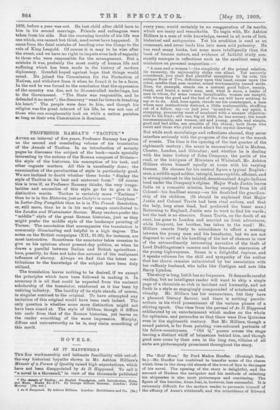NOVELS.
AS IT HAPPENED.f
THE fine workmanship and intimate familiarity with out-of- the-way historical bypaths shown in Mr. Ashton Hilliers's Memoir of a Person of Quality raised high expectations, which have not been disappointed by As It Happened. To call it "a novel in a thousand," in view of the thousands published • The is m& of Tacittur: an English Translittton, with Introduction, Notes, and Maps. Books XI.-IVI. By George Gilbert Ramsay. London: John Murray. [15s. net.] As It Happened. By Ashton Hilllers. London: Hutchinson and Co. fee.] every year, would certainly be no exaggeration of its merits, which are many and remarkable. To begin with, Mr. Ashton Hallam is a man of wide knowledge, versed in all sorts of lore, historical and antiquarian. Yet his erudition is used as an ornament, and never leads him into mere arid pedantry. He has read many books, but none more intelligently than the book of human nature, and evidence of faithful study con- stantly emerges in reflections such as the excellent essay in miniature on personal magnetism :- " A man and a woman !—the simplicity of the primal relation, its necessity, its universality strike one silent. Yet narrowly considered, you shall find plentiful exceptions to its rule, the antique Rule of Two, deficiency upon this baud, excess upon the other, misfits that pass muster, sound workmanship tossed aside. Here, for example, stands me a natural good fellow, seemly, frank, and brave, a man's man, and, what is more, a leader of men in whom, for some reason inexplicable, women see naught, with whom the good and tho bad of the sex will have nothing to say or to do. And, here again, stands use his counterpart, a man whom men instinctively distrust, a little contemptible, shuffling rat of a fellow, say—or just poor 'so-and-so,' or, say again, strapping, presuming mass of manhood with a manner objection- able to his kind ; all's ono, big or little, he has sorcery, the touch incommunicable, and women, old and young, gentle and simple, good and bad alike, are sensible of the charm ; both those who resist and those who yield must admit the mystic drawing."
But while such moralisings and reflections abound, they never interfere seriously with the progress of the story or the march of events. The time is the opening of the last quarter of the eighteenth century ; the scene is successively laid in Madras, Chester, London, and Gibraltar ; and whether he is dealing with the inner history of John Company, the perils of the road, or the intrigues of Ministers at Whitehall, Mr. Ashton Hilliers shows himself equally at home with his varying themes. He chooses for his central figure a typical English- man, a middle-aged soldier, intrepid, incorruptible, efficient, and
in strong contrast to the tainted, denationalised Anglo-Indians bred under the Company's regime. Major Wade Justin leaves
India on a romantic mission, having accepted from his old Colonel—his deadliest enemy—on his deathbed the guardian- ship of his children. (It should be explained that Major J ustiu and Colonel Travis had been rival suitors, and that the lady, long since dead, had preferred the baser man.) Returning to England, Justin sets to work to find his wards ; brit the task is no sinecure. Susan Travis, on the death of an aunt, has gone to London and married an Irish adventurer, while Draycott, her brother, has taken to the road ! Mr. Hilliers resorts freely to coincidence to effect a meeting between the young man and his benefactor, but we are not disposed to cavil at his handling of the law of chances in view of the extraordinarily interesting narrative of the theft of Lord Duddingstone's cameos and the dramatic conversion of the young highwayman. Susan is a delightful ingnue, and it speaks volumes for the skill and sympathy of the author that her charm remains untarnished by her association with
her ruffianly husband, who talks like Costigau and acts like Barry Lyndon.
The story is long, but it has no longueurs. It demands careful reading, but no intelligent reader will want to skip a single page of a chronicle so rich in incident and humanity, and set forth in a style so engagingly compounded of scholarship and vivacity. Mr. Millers has his mannerisms, but they have a pleasant literary flavour, and there is nothing pseudo- archaic in his vivid presentment of the various phases of a stirring epoch. One rises from the perusal of As It Happened exhilarated by an entertainment which makes on the whole for optimism, and persuades us that there were Don Quixotes even in the eighteenth century. But Mr. Hilliers, though a sound patriot, is far from painting rose-coloured portraits of
his fellow-countrymen. " Old Q." passes across the stage leaving a distinct whiff of brimstone behind him, and though good men come by their own in the long run, villains of all sorts are picturesquely prominent throughout the story.






































 Previous page
Previous page